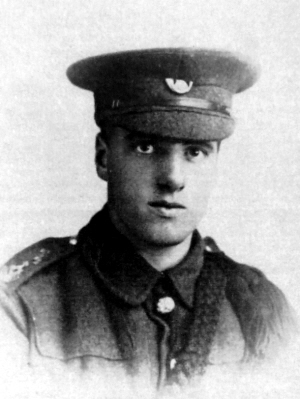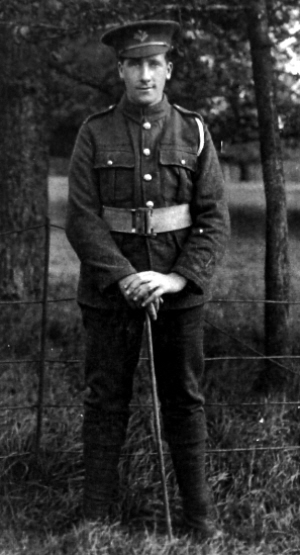
Stanley Lockwood was born in Ossett on the 1st October 1896, the second child and eldest son of Walter Lockwood and his wife Mary (nee Moss), who married at South Ossett Christ Church on the 15th December 1892. The couple had six children, but one child had died before April 1911. Stanley was baptised at Ossett Holy Trinity Church on the 10th November 1896. Stanley’s father, Walter Lockwood, born 1870, was the son of Mark Lockwood of Little Town End, Ossett and a younger brother of Quartermaster and Honorary Captain Joshua Lockwood who also died in army service.
Walter Lockwood had lived the whole of his life at Little Town End and may have taken over the Little Town End home of his father, Mark, when he died in 1898. In 1901 and 1911 Walter and Mary were living at Little Town End with the surviving children from their marriage. Walter was working as a joiner and builder but latterly had turned his hand to farming. In 1911, aged 14, Stanley was assisting his father and was described as ‘a farmer’s son’.
Stanley Lockwood’s army service record has not survived but it is known that he enlisted in 1916 in Wakefield and joined the 2/4 Battalion of the King’s Own Yorkshire Light Infantry. He did not serve overseas until after 31st December 1915, and probably embarked for France in early 1917. Private Stanley Lockwood was posthumously awarded the British and Victory medals.
The Territorial 2nd/4th Battalion, KOYLI was formed at Wakefield on the 30th September 1914 as a second line unit. On the 1st March 1915 they moved to Bulwell and were attached to 187th Brigade in 62nd (2nd West Riding) Division. They moved in April 1915 to Strensall and in May to Beverley, going on in November to Gateshead, in January 1916 to Larkhill and in June 1916 to Flixton Park near Bungay. They moved again in October 1916 to Wellingborough and landed at Le Havre, France on the 15th January 1917.
Stanley Lockwood enlisted in 1916. He was a farmer when called up and was straight away put in charge of army horses. These did front line work, pulling guns and shells. On one of these missions, both his horses were killed and Stanley himself was severely wounded, and died of his wounds on the 14th December 1917.
It is likely that Stanley Lockwood was wounded during intense fighting at the Battle of Cambrai, between the 20th November and the 6th December 1917. To the west of Flesquières, the 62nd (2nd West Riding) Division swept all the way through Havrincourt and Graincourt to within reach of the woods on Bourlon Ridge. The effort was aimed at Bourlon Ridge. Fighting was fierce around Bourlon and at Anneux (just before the woods) was costly. German counter-attacks squeezed the British out of Moeuvres on the 21st November and Fontaine on the 22nd November; when Anneux was taken, the 62nd Division found themselves unable to enter Bourlon Woods. The British were left exposed in a salient. Haig still wanted Bourlon Ridge and the exhausted 62nd Division was replaced by the 40th Division.
The “Ossett Observer” 1 had this obituary for Private Stanley Lockwood:
“Well-Known Soldier’s Death In Hospital – Following upon news received last week that Private Stanley Lockwood (21), of the K.O.Y.L.I., son of Mr. Walter Lockwood, of Town-end, Ossett, was seriously ill at a Rouen hospital, having been wounded in the leg and hand, an official notification has since been received, stating that he died on December 14th. The matron of the hospital writes that he was improving nicely, but had a relapse and died rather suddenly. ‘He was such a splendid patient,’ she added, ‘that we all feel the grief that his death has caused.’ Deceased joined the army about three years ago, and had been in France about eleven months. He used to help his father in the milk business and was well-known.”
Private Stanley Lockwood, aged 21 years, son of Walter and Mary Lockwood, of 14, Town End, Ossett, died from wounds on the 14th December 1917. He is buried at grave reference P. V. Q. 5B. at the St. Sever Cemetery Extension, Rouen, 2 Seine-Maritime, France. St Sever Cemetery and St. Sever Cemetery Extension are located within a large communal cemetery situated on the eastern edge of the southern Rouen suburbs of Le Grand Quevilly and Le Petit Quevilly.
 During the First World War, Commonwealth camps and hospitals were stationed on the southern outskirts of Rouen. A base supply depot and the 3rd Echelon of General Headquarters were also established in the city.
During the First World War, Commonwealth camps and hospitals were stationed on the southern outskirts of Rouen. A base supply depot and the 3rd Echelon of General Headquarters were also established in the city.
Almost all of the hospitals at Rouen remained there for practically the whole of the war. They included eight general, five stationary, one British Red Cross and one labour hospital, and No. 2 Convalescent Depot. A number of the dead from these hospitals were buried in other cemeteries, but the great majority were taken to the city cemetery of St. Sever. In September 1916, it was found necessary to begin an extension, where the last burial took place in April 1920.
The cemetery extension contains 8,348 Commonwealth burials of the First World War (ten of them unidentified) and in Block “S” there are 328 from the Second World War (18 of them unidentified). There are also 8 Foreign National burials here.
Stanley’s eldest brother Oliver also served in the army in WW1, enlisting on 17th November 1915 as a Private with the Royal Welsh Fusiliers, service number 10556. He had great difficulty in the platoon he was in since all the other men spoke Welsh.
He was badly wounded in the shoulder during the Battle of the Somme in July 1916 and then served with the Labour Corps at Nottingham, service number 584506, but after the War, on the 2nd August 1919, he was discharged on medical grounds as a result of his wounds.
Private Lockwood was awarded the Silver War badge at his discharge. The sterling silver war lapel badge was intended to be worn in civilian clothes. It had been the practice of some women to present white feathers to apparently able-bodied young men who were not wearing the King’s uniform. The badge was to be worn on the right breast while in civilian dress, it was forbidden to wear on a military uniform.
Oliver Lockwood was also awarded the British and Victory medals and he died in 1944, aged 72 years.
Above: Private Oliver Lockwood, 10556, Royal Welsh Fusiliers, Stanley Lockwood’s older brother who survived WW1.
References:
1. “Ossett Observer”, 22nd December 1917